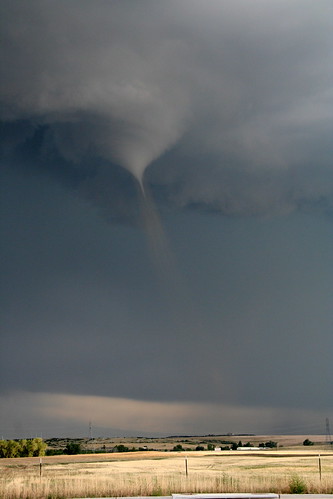Tornadoes and Earthquakes and Storms, Oh my!

NEWS JUNKIE POST
May 2, 2011 at 8:32 amThe recent tornadoes in the United States have lead to a resurgence of articles talking about the link between extreme weather, natural disasters and climate change. If you are an interested member of the general public you are undoubtedly confused as the two sides of the debate seem to be making opposing claims, and both seem to have some science to back them up.
I’d like to talk a bit about why there is this confusion and what it means in practical terms for you and me. Then I’d like to discuss the opinion of the folks who take this issue very seriously indeed. No, I don’t mean the scientists, much more seriously than that – I am referring to the insurance industry.
The critical phrase is “seem to be making opposing claims“, because for the most part they are not. The climate change Deniers erroneously characterize the science based reports as ascribing the various tornadoes, storms and what have you as being caused by or linked to climate change. That is not what the ones I sampled were actually saying.
If you read the various reports they correctly note that given the current state of our knowledge it is impossible to directly link the recent extreme weather to climate change. It is also impossible to definitively say there is no link; that’s how uncertainty works.
Now from what I can gather it is probable that the influence of climate change on the most recent spate of tornadoes in the US south west was very small to none, but that’s not the end of the story.
In this case the problem boils down to the fact of our incomplete knowledge of many  complex and interacting systems. Tornadoes are determined to a large extent by atmospheric moisture content and wind shear. Climate change is causing the former to increase and the latter to decrease. How fast and by how much each will change, particularly on a regional scale, is anyone’s guess.
complex and interacting systems. Tornadoes are determined to a large extent by atmospheric moisture content and wind shear. Climate change is causing the former to increase and the latter to decrease. How fast and by how much each will change, particularly on a regional scale, is anyone’s guess.
The recent tornadoes are being ascribed more to the effects of the La Nina/El Nino natural cycles than anything else, but these simply refer to differences in ocean surface temperature. Stating the obvious, ocean temperature is most definitely being affected by climate change. Exactly how, and what the consequences will be are less well understood,
The oceans are not static; they are dynamic systems with complex currents and cycles that range from the tides to oscillation patterns with periods from years to decades. These are influenced primarily by water temperature and salinity, both of which are changing as a consequence of climate change. As one “natural” cycle changes it also influences the others, and so on.
Now add to that the uncertainties about climate change. In this case the biggest uncertainty is what humans are going to do about it and when. Based on current policies and actions the most likely answer is “far too little, way too late.” That being said, it’s not just a matter of how much the climate changes, but also how fast.
Most of the changes in temperature etc that we see discussed relate to the coming century. That is most definitely not because climate change then plateaus or stops. If we do nothing we face a catastrophic 21st century; after that things start to get really bad.
Be that as it may, a scientist cannot give a single answer to what extreme weather is going to be like in 30 or 50 yrs if you can’t tell her what our CO2 emissions are going to be over the next 30 or 50 yrs. Without that information all she can do is give a range of possibilities from the highest to lowest possible scenarios, with the added uncertainty of our incomplete understanding of these complex systems.
Video: Scott Mandia on the recent swarm of tornadoes, flooding, and extreme precipitation events
Hat tip to Climate Change: The Next Generation
For tornadoes the wisdom at this time suggests that the balance between increasing moisture and decreasing wind shear is going to keep things more or less as they have been in the past for much of this century. After that the increased moisture will become the more dominant influence and tornado intensity and frequency will increase.
Hurricanes and storms are a different matter in that it looks like we will be seeing increased strength of storms in the foreseeable future, but not frequency. Here again there are most of the same uncertainties as discussed above, from our incomplete understandings of the systems involved to the uncertainties about how we will respond.
Regardless, in talking about storms we tend to over focus on the spectacular visuals of tornadoes and hurricanes. The greater threat may actually be from flooding and water damage, regardless of whether the storms are associated with the impressive visuals of high winds. What made New Orleans a such catastrophe was the water, not the wind.
The Japanese earthquake has also led to some speculation as to the link between climate change and earthquakes. At this time it seems pretty much certain that there is no link, and certainly none between the Japanese quake and climate.
 However, we are playing with the natural systems on a massive scale. We know for a fact that huge ice sheets press the Earths’ crust down, and that they rebound when the ice melts. Just how that vertical movement affects the various fault lines naturally depends on magnitude, proximity, how other regions are responding, and any number of other factors.
However, we are playing with the natural systems on a massive scale. We know for a fact that huge ice sheets press the Earths’ crust down, and that they rebound when the ice melts. Just how that vertical movement affects the various fault lines naturally depends on magnitude, proximity, how other regions are responding, and any number of other factors.
Here again, tell a geologist just how fast how much weight is going to shift from and to where, and she may be able to start giving you an informed opinion that is still rife with uncertainty and unknowns. Since we can’t even supply that basic information it becomes anyone’s guess.
We do know that Greenland alone is already losing 300 billion tonnes of ice/year. When you start shifting weight on that scale it is a given that at some point there are going to be consequences, but is that within years? decades? centuries? more?
So the core lessons of recent events are really twofold:
- Regardless of how much or little these particular events were driven by climate change, the ones that climate change will be causing will be just like them or worse.
- We are very vulnerable to extreme weather, and as frequency and/or intensity increases we are probably going to be less and less able to deal with the consequences.
It’s a funny world
If we get this wrong it is going to mean widespread human suffering and misery. For the average person it could mean the loss of your home, livelihood, or even your life. Oddly, we seem to feel that these are fairly inconsequential concerns, at least if you judge based on our actual behaviour.
On the other hand the insurance industry has something far more important at stake, money. They are taking the extreme weather science very seriously indeed, and acting accordingly.
For the insurance industry the uncertainty is also the biggest issue. If anyone could tell them with reasonable certainty what is going to happen and when then they could adjust their businesses accordingly. As it is they are mapping out the scenarios and doing their own modeling of what kind of world to expect.
Some of their probable responses are predictable, such as increasing rates and limiting liability for coastal properties, refusing to insure high risk properties such as those on flood plains and in known storm hot spots. Others are much trickier, such as trying to determine the likely health and social consequences (eg wars and civil unrest) of climate change.
For the insurance industry this specificity about details may be needed, but it won’t be  forthcoming. For the rest of us the quibbling about specifics is a ridiculous distraction. We know extreme weather is going to get worse and that it will result in widespread destruction and suffering; why do the specifics matter?
forthcoming. For the rest of us the quibbling about specifics is a ridiculous distraction. We know extreme weather is going to get worse and that it will result in widespread destruction and suffering; why do the specifics matter?
It’s analogous to insisting that before advising you to quit smoking your Dr should be able to tell you whether you will get emphysema and/or heart disease before or after lung cancer, and if you get cancer whether in the right or left lung first, anterior or posterior, how big the nodules will be, and so on. It’s idiotic.
With smoking the only relevant point is that you will probably develop cancer or some other lung disease. Regardless of the uncertainty of whether you will contract a fatal or debilitating disease or not, it is still a good idea to quit smoking simply based on the odds and the other negative effects it has on health. It should be no brainer.
With climate change we know we are destabilizing massive systems and that the consequences are going to be anything from merely catastrophic to something far worse. Quibbling about exactly when and how is not really about a rational desire to make informed decisions in a timely manner, it’s about an addict looking for any excuse to continue indulging their addiction, preferably indefinitely.
We already know how that works out.
Some reading:
- Are tornadoes getting stronger and more frequent?
- Killer Tornadoes, Horrible and Still Unknowable
- Top Climate Scientist On The Monster Tornadoes: ‘It Is Irresponsible Not To Mention Climate Change’
- Tornadoes whipped up by wind, not climate: officials
- Does climate change mean more extreme, deadly weather and tornado outbreaks?
- Peter H. Gleick: A Cost of Denying Climate Change: Accelerating Climate Disruptions, Death, and Destruction
- Spinning Tornados
- Tornado Outbreak Raises Climate Change Questions
- Tennessee Valley Authority: “We have never experienced such a major weather event in our history”
- Natural disasters? are we to blame?
- Tornadoes and Global Warming
- Wally’s World
- Climate Change & Insurance – ‘Hope’ Is Not A strategy · Environmental Management & Energy News · Environmental Leader
- Weathering climate change | Swiss Re – Leading Global Reinsurer
- The Impact of Climate Change on Insurance against Catastrophes
- Insurance in a Climate of Change
- Insurer Initiatives – Climate & Insurance
- Investor Network on Climate Risk
- Climate And The Environment | Travelers Insurance
Image Credits:
Tornado Destruction by pocketwiley
Tornado in Outlook, Saskatchewan by Jordon
June 7th Tornado By Jon Person
Related Articles
- January 4, 2011 Disasters In 2010: Nine-Tenths Were Severe Weather-Related Events Linked To Climate Change
- November 27, 2013 Black Friday: An Orgy of Trinkets and Baubles
- November 20, 2013 Fragmentation of News and Causes: The Urgent Need to Think Globally
- August 25, 2012 The Apocalypse of Overpopulation and Climate Change: Fighting for Water and Food
- December 13, 2012 Climate Change: Dying by Two Degrees
- May 30, 2020 Climate Crisis, Pandemics and Bad Governance: Humanity’s Existential Threats













3 Responses to Tornadoes and Earthquakes and Storms, Oh my!
You must be logged in to post a comment Login